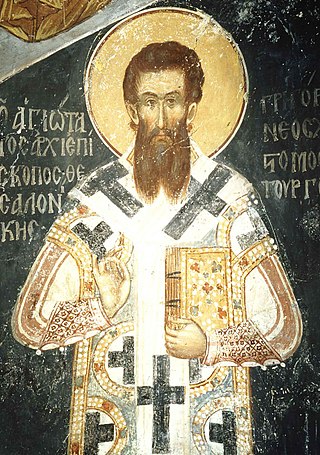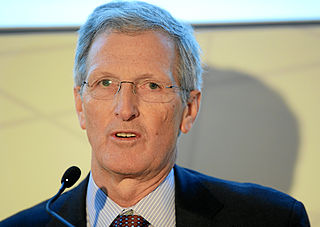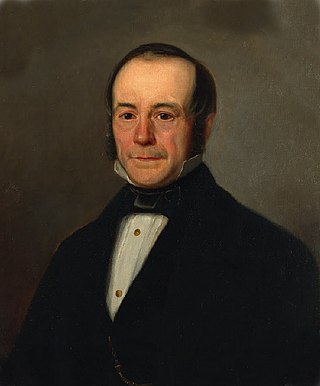
The Council of Constance was an ecumenical council of the Catholic Church that was held from 1414 to 1418 in the Bishopric of Constance (Konstanz) in present-day Germany. The council ended the Western Schism by deposing or accepting the resignation of the remaining papal claimants and by electing Pope Martin V. It was the last papal election to take place outside of Italy.

The First Council of Constantinople was a council of Christian bishops convened in Constantinople in AD 381 by the Roman Emperor Theodosius I. This second ecumenical council, an effort to attain consensus in the church through an assembly representing all of Christendom, except for the Western Church, confirmed the Nicene Creed, expanding the doctrine thereof to produce the Niceno-Constantinopolitan Creed, and dealt with sundry other matters. It met from May to July 381 in the Church of Hagia Irene and was affirmed as ecumenical in 451 at the Council of Chalcedon.

Gregory of Nazianzus, also known as Gregory the Theologian or Gregory Nazianzen, was a 4th-century Archbishop of Constantinople and theologian. He is widely considered the most accomplished rhetorical stylist of the patristic age. As a classically trained orator and philosopher, he infused Hellenism into the early church, establishing the paradigm of Byzantine theologians and church officials.

Pope Gregory XII, born Angelo Corraro, Corario, or Correr, was head of the Catholic Church from 30 November 1406 to 4 July 1415. Reigning during the Western Schism, he was opposed by the Avignon claimant Benedict XIII and the Pisan claimants Alexander V and John XXIII. Gregory XII wanted to unify the Church and voluntarily resigned in 1415 to end the schism.

Gregory Palamas was a Byzantine Greek theologian and Eastern Orthodox cleric of the late Byzantine period. A monk of Mount Athos and later archbishop of Thessaloniki, he is famous for his defense of hesychast spirituality, the uncreated character of the light of the Transfiguration, and the distinction between God's essence and energies. His teaching unfolded over the course of three major controversies, (1) with the Italo-Greek Barlaam between 1336 and 1341, (2) with the monk Gregory Akindynos between 1341 and 1347, and (3) with the philosopher Gregoras, from 1348 to 1355. His theological contributions are sometimes referred to as Palamism, and his followers as Palamites.

The mayor of Chicago is the chief executive of city government in Chicago, Illinois, the third-largest city in the United States. The mayor is responsible for the administration and management of various city departments, submits proposals and recommendations to the Chicago City Council, is active in the enforcement of the city's ordinances, submits the city's annual budget and appoints city officers, department commissioners or directors, and members of city boards and commissions.

The Western Schism, also known as the Papal Schism, the Great Occidental Schism, or the Schism of 1378, was a split within the Catholic Church lasting from 1378 to 1417 in which bishops residing in Rome and Avignon both claimed to be the true pope, and were joined by a third line of Pisan claimants in 1409. The schism was driven by personalities and political allegiances, with the Avignon papacy being closely associated with the French monarchy. These rival claims to the papal throne damaged the prestige of the office.
A headmaster/headmistress, head instructor, bureaucrat, head teacher, head, chancellor, principal or school director is the staff member of a school with the greatest responsibility for the management of the school. In some English-speaking countries, the title for this role is principal.

Sir Gregory Paul Winter is a Nobel Prize-winning English molecular biologist best known for his work on the therapeutic use of monoclonal antibodies. His research career has been based almost entirely at the MRC Laboratory of Molecular Biology and the MRC Centre for Protein Engineering, in Cambridge, England.

Sir Patrick Alfred Jennings, was an Irish-Australian politician and Premier of New South Wales.

The National Theatre of Scotland, established in 2006, is the national theatre company of Scotland. The company has no theatre building of its own; instead it tours work to theatres, village halls, schools and site-specific locations, both at home and internationally.

Gregory "Greg" R. Page is an American businessman. He served as executive chairman of Cargill, Inc. of Minnetonka, Minnesota.

John Rutherfoord was a U.S. political figure. He served as Acting Governor of Virginia between 1841 and 1842. He was the brother-in-law of Edward Coles.
Founded in 2001, the American Council on Renewable Energy (ACORE) is a member-based, 501(c)(3) national non-profit organization that unites finance, policy and technology to accelerate the transition to a renewable energy economy.

Gregory Balestrero is an American industrial engineer, and CEO emeritus of the Project Management Institute. He has a record of overseeing administrative, financial and internal affairs for professional associations.

Gregory Krumbock is a South African politician, a Member of Parliament with the Democratic Alliance (DA), and the Shadow Minister of Tourism from 2009 to 2012.

The Michigan Crossroads Council (MCC) is a local council of the Boy Scouts of America that encompasses the Lower Peninsula of Michigan. The council was formed in 2012 by the merger of nine councils.

The Premier of the Soviet Union was the head of government of the Union of Soviet Socialist Republics (USSR). The office had four different names throughout its existence: Chairman of the Council of People's Commissars (1923–1946), Chairman of the Council of Ministers (1946–1991), Prime Minister and Chairman of the Committee on the Operational Management of the Soviet Economy. Long before 1991, most non-Soviet sources referred to the post as "Premier" or "Prime Minister."
Gregory J. Hayes is an American businessman. He was the chairman and CEO of United Technologies from September 2016 to April 2020, and is now the CEO of Raytheon Technologies.
Mary Gregory Jewett was an American preservationist, journalist, public official, and historian who ran the Georgia Historical Commission from 1960 through its dissolution in 1973, and served as the first president of the Georgia Trust for Historic Preservation. In 2013, she was posthumously named a Georgia Woman of Achievement.


















